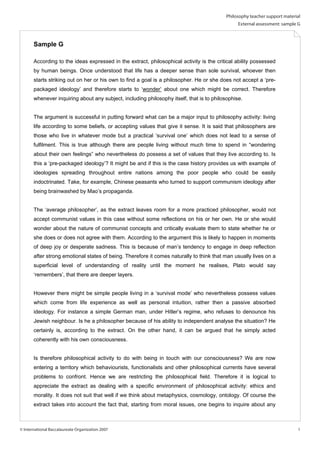1) The document discusses philosophical activity and what distinguishes a philosopher from others. It argues that philosophical activity involves critically analyzing ideas rather than passively accepting pre-packaged ideologies.
2) A philosopher wonders about fundamental concepts and questions socially accepted assumptions by thinking independently. However, philosophical activity requires more than just wondering - it is a search for truth and understanding of reality through dedication to knowledge.
3) True philosophical activity moves beyond just developing critical thinking skills. It requires gaining an accurate understanding of reality by exiting the cave of limited perspectives, as in Plato's allegory. A philosopher sees the true nature of things that others do not due to narrower horizons.

![Philosophy teacher support material
External assessment: sample G
© International Baccalaureate Organization 2007
concepts and goes on until reaching the radical meaning of words. On the other hand the extract
remains too vague in defining the state of wondering as the capacity to challenge socially accepted
assumptions.
In my opinion philosophical activity is the search for truth. It may start from a state of wondering, from
a development of critical skills but it needs to make a step forward beyond that. What differentiates a
philosopher from an aware person, in fact, is the lack of the Knowledge of the latter.
Philosophy means love for Knowledge and implies the total dedication of its performer to the
understanding of the outside world as well as the inner reality.
I believe that philosophical activity can be understood as the attempt to supplement the inner world of
our true self, mind, body with the existence, or perceived existence, of an outside reality ruled by
unknown laws—laws that philosophers tackle and explain with different arguments. This is the reason
why no other science or discipline on earth seems to give man answers which really explain our
existence and purpose of existence in a more exhaustive way than philosophy.
I therefore agree with the extract in as far as the development of critical thinking skills is a way
leading towards a more accurate understanding of reality, although that alone is not sufficient to make
one a philosopher. Let us consider Plato’s myth of the cave, we shall compare a person who starts
wondering about the shades he sees on the wall of the cave. This fellow may be a philosopher
according to the extract, in fact he is challenging what he has been given to believe is for real. Yet,
despite his deep thoughts about those shapes, he is still imprisoned in the cave struggling to find
sense in being there. Whereas the real philosopher understands what is going on and exits the cave
to see the ‘real world’.
This is how I picture philosophical activity. Wondering may be a good starting point but it can also
lead nowhere without the right intuition/reasoning/discovery which gives one the truthful picture of
reality. Only after being able to see that can one consider oneself a philosopher. Only when one is
able to see what many others, because of a shortening of horizons, are not capable of figuring out
can one consider oneself as engaging in philosophical activity.
[912 words]](https://image.slidesharecdn.com/easamplegen-150107204544-conversion-gate02/85/Ea-sample-g_en-2-320.jpg)